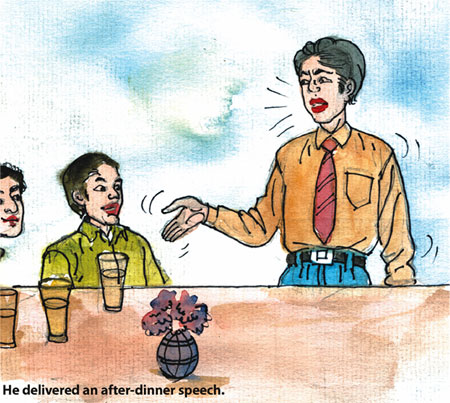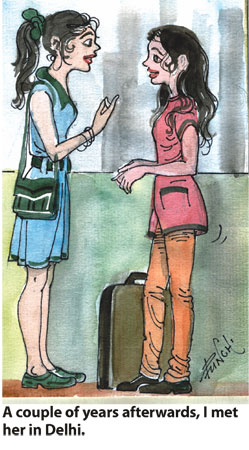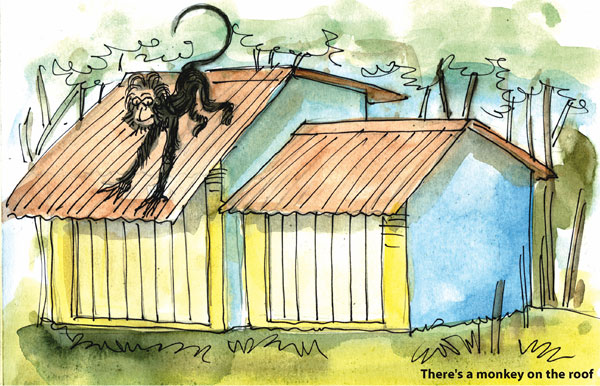|

by R. S. Karunaratne
How to use ‘after’
As a preposition, ‘after’ means “following in time, place or order.”
Are you going to read for a degree after the GCE Advanced Level
examination?
Your name appears after mine on the pass list.

Where will you be on the day after tomorrow?
I had to wake up the others after midnight.
A: What’s the time?
B: It’s a quarter after two.
People are protesting day after day on various issues.
We’re having meeting after meeting with the new management.
Ravi slammed the door after him.
As an adverb ‘after’ means “later than someone or something else.”
Francis assumed duties on the 1st of January 2015 and Sam arrived
soon after.
I’m busy today. Shall we meet the day after?
As a conjunction ‘after’ means “at a time which is later than another
event.”
Two months after the election, the members elected their leader.
Shortly after I started the engine, the car moved on smoothly.
George went to see his parents immediately after he returned to the
island.
‘After’ is used as a prefix.
He delivered an after-dinner speech.
Do you provide after-sales service?
Do you like to join an after-hours club?
Aftercare
Patients need aftercare when they leave hospital.
After effects
Certain drugs can have after effects when you take them regularly.
Such after effects are usually unpleasant.
‘Afterglow’ is a pleasant feeling produced after an important event.
The Sri Lankan Cricket Team were basking in the afterglow of winning
the World Cup.
‘Afterlife’ means life after death.
Some people believe that they will be reunited with their friends and
relations in the afterlife.
‘Aftermath’ is the period which follows an unpleasant event or
accident and the effects which it causes.
Many people died in the aftermath of communal clashes.

‘Afterwards’ means after an event or a time that you have just
mentioned.
Afterwards, Sam said he’d never been so upset in his life.
What’s the use of going to the gym if you overeat afterwards.
A couple of years afterwards, I met her in Delhi.
One after another
There were four loud explosions one after another. (each thing
happens immediately after the previous one.)
[Activity]
Use ‘after’ or ‘before’ in the blanks and check your answers with the
key.
1. I must talk to John .......... I phone Sam.
2. They moved into a new apartment ........... they got married.
3. I brush my teeth ............ I go to bed.
4. There’s always a lot of work .......... we get back from holiday.
5. She usually cleans her room .............. she goes out.
6. I meditate for half an hour ............... I start work.
7. Amanda got very ill .............. she returned from Pakistan.
8. John started playing volleyball ........... he stopped playing
cricket.
9. I’ll see you .............. you leave for London.
10. We’ll talk about it ............... I get back.
Key:
1. before 2. after 3. before 4. after 5. before 6. before 7. after 8.
after 9. before 10. after
Match words and meanings
Here’s an exciting way to enrich your vocabulary. Match the words in
column ‘A’ with their meanings in column ‘B’ and check your answers with
the key. The first has been done for you.
[Column A]
J 1. downhill
... 2. downmarket
... 3. downplay
... 4. downpour
... 5. downright
... 6. downside
... 7. down-to-earth
... 8. downtrodden
... 9. downturn
.. 10. downward
.. 11. downy
.. 12. doyen
.. 13. doze
.. 14. dozen
.. 15. drab
.. 16. draftsman
.. 17. drag
.. 18. dragnet
.. 19. drained
.. 20. drake
.. 21. drama queen
.. 22. dramatic
.. 23. dramatis personae
.. 24. dramatist
.. 25. drastic
[Column B]
A. to make something seem less important
B. filled with feathers
C. the most respected person in a particular type of work
D. someone who writes legal documents
E. to move something by pulling it along a surface
F. a series of actions taken by the police to catch criminals
G. the disadvantage of a situation
H. to have a short sleep
I. twelve
J. towards the bottom of a hill
K. a male duck
L. badly and unfairly treated
M. someone who gets upset over small problems
N. very sudden or full of excitement
O. very tired
P. boring
Q. moving towards a lower position
R. A lot of rain in a short time
S. a reduction in the amount of something
T. a person who writes plays
U. severe or sudden
V. all the characters in a play
W. practical and sensible
X. extremely or very great
Y. cheap in quality and price
Key:
2. Y 3. A 4. R 5. X 6. G 7. W 8. L 9. S 10. Q 11. B 12. C 13. H 14. I
15. P 16. D 17. E 18. F 19. O 20. K 21. M 22. N 23. V 24. T 25. U
Starters
Prepositions - Part 3:
‘On’ with places
Learn how we use the preposition ‘on’ in sentences.
Most old people find it difficult to sit on the floor.
Pedestrians must always walk on the pavement.
There is a black dot on your shirt.
We live on the first floor of this building.
Paris is on the Seine.

How many people work on the farm?
There's a map on page 90.
I saw her image on the screen.
We spent a few days on an island.
Children play on the beach.
In Sri Lanka we drive on the left.
He wrote his address on the back of an envelope.
There's a monkey on the roof.
Shyama lives on the 32nd floor.
London is on the Thames.
There are many books on the shelves.
The school concert is on Sunday.
Can you meet me on Wednesday?
I was born on the 5th of November.
Where will you be on Christmas Day?
We don't go to school on Sunday morning.
Are you free on Monday evening?
I met her on Sunday night.
‘On time’ means ‘at the right time.’
The plane took off on time.
Most meetings never start on time.
You're never on time.
‘On’ can be used for position and movement.
I was sitting on a log. (Position)
The rain is falling on the valley. (Movement)
You can see my name on the door. (Position)
We went on board Nippon Maru. (Movement)
‘Onto,’ written as one word, is used chiefly about people and animals.
People climbed onto their roofs to see the procession.
Father lifted the baby onto the bed.
The cat jumped onto the table.
‘On’ can be used as an adverb.
Go on. I'm listening to you.
Come on. Tell me the truth.
‘Switch on’ is a phrasal verb meaning ‘to make something start
working.’
We switch on lights, television or computers.
She switched on the radio to listen to music.
Do you mind if I switch the lights on?
‘Turn on’ is a phrasal verb meaning ‘to make something start
working.’
She went into the bathroom and turned on the shower.
Do you want me to turn the lights on?
‘On and off’ means ‘not very often.’
I go to the library on and off.
I have been trying to learn German on and off.
On television
We watch a cricket match on television.
Note: We don't see television.
We watch television.
On the radio
We listen to songs broadcast on the radio.
Quiz on idioms
An idiom is a special kind of phrase. It is a group of words which
have a different meaning when used together from the one it would have
if the meaning of each word were taken individually. Tick the meaning of
the following idioms and check your answers with the key.
1. If you do something at the drop of a hat ...
(a) you do it willingly and without hesitation
(b) you do it most unwillingly
(c) you lose your temper
2. If an amount of money is a drop in the ocean ...
(a) it is a significant amount
(b) it is a very small amount
(c) it is a very big amount
3. If you beat the drum for someone ...
(a) you hate them
(b) you praise them
(c) you support them
4. If someone is drunk as a skunk ...
(a) they are very drunk
(b) they are not drunk
(c) they are sober
5. If something is as dry as a bone ...
(a) it is expensive
(b) it is wet
(c) it is very dry
6. If you refer to someone as a dead duck ...
(a) they are successful
(b) they are dead
(c) they are a failure
7. If you refer to a government as a lame duck ...
(a) it is popular
(b) it has very little power
(c) it is very powerful
8. If you refer to someone as a sitting duck ...
(a) they are an obvious target
(b) they are stupid
(c) they are crafty
9. If you take to something like a duck to water ...
(a) you are a good swimmer
(b) you are very bad at it
(c) you are naturally good at it
10. If someone has got their ducks in a row ...
(a) they have got everything properly organised
(b) they are thoroughly disorganised
(c) they are good at counting ducks
Key:
1. (a) 2. (b) 3. (c) 4. (a) 5. (c) 6. (c) 7. (b) 8. (a) 9. (c) 10.
(a) |

